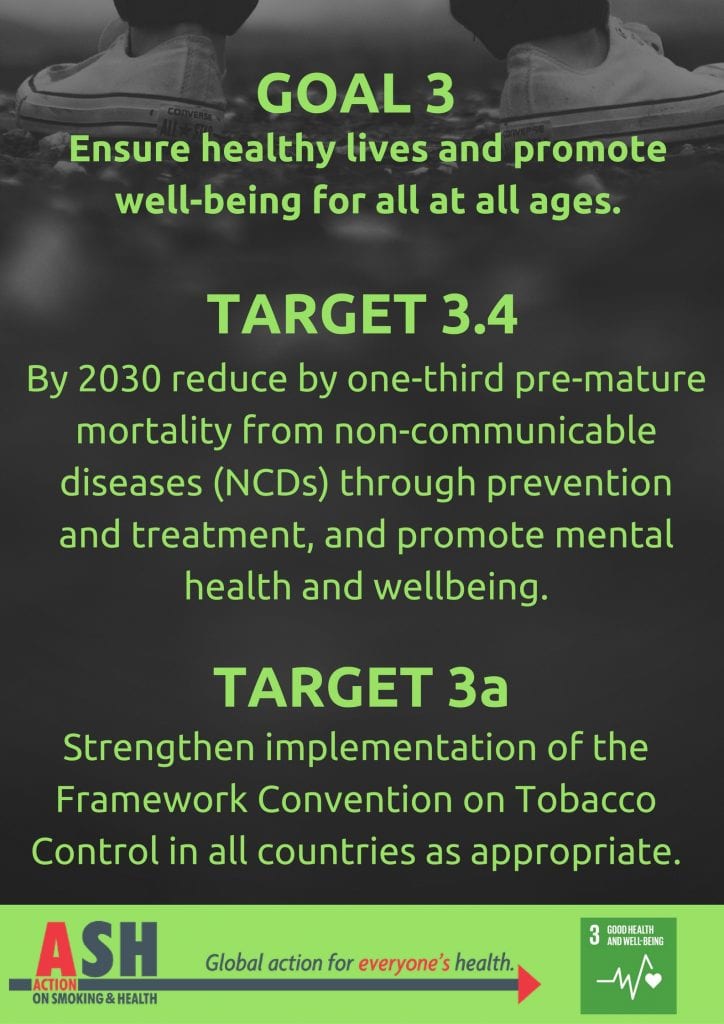Here’s a look back at the timeline of ASH’s involvement in the development of the UN Sustainable Development Goals (SDGs) from 2009 to present.
Importance of NCDs and Tobacco Control in the Sustainable Development Agenda
Tobacco use is the number one cause of preventable death globally and the one risk factor common to the major non-communicable diseases (NCDs)–cancer, cardiovascular disease, chronic respiratory disease and diabetes. Yet until very recently, tobacco control, FCTC implementation, and NCDs were not high on the international development agenda. Tobacco control and NCDs were not included in the Millennium Development Goals that were adopted in 2000. In fact, tobacco control is still relatively unknown within the global development community.
Rio+20 and Sustainable Development
In June 2012, the UN Conference on Sustainable Development (Rio+20) started the global dialogue that would ultimately set the foundation for the post-2015 development framework. The outcomes of Rio+20 included the agreement to initiate the process within the General Assembly to create the sustainable development goals (SDGs).
After Rio +20, the sustainable development agenda has been at the center of all of the discussions at the UN surrounding the post-2015 development agenda. The 3 main pillars include social, economic, and environment. Tobacco control needs to be recognized as not just a health issue, but a broader development issue. ASH has been spending the past few months engaging at the UN and in New York City to ensure that tobacco control is included in the post-2015 agenda.
NCDs in the Post-2015 Development Agenda
In May 2013, at the World Health Assembly in Geneva, NCDs were an important part of the discussion. Member states reaffirmed their commitment to address NCDs by adopting an omnibus resolution, which includes adopting a global monitoring framework, endorsing the Global NCD Action Plan, the global coordination mechanism, and implementing the Global Action Plan. The NCD framework should be integrated into the global development framework to curb the NCD and tobacco control epidemic.
In July 2014, the UN NCD Review was held in New York to take stock of progress since the High Level Meeting on NCDs in 2011, identify gaps in action, and gather consensus on scaling up and transforming commitments into action at the national level. The meeting produced an outcome document that was unanimously adopted by Member States. This document emphasized the need to reaffirm commitment to accelerate implementation of the FCTC by Parties and encourage countries to become Parties to the treaty.
Post-2015 Development Agenda Process
Up until this point, the post-2015 development agenda has produced several reports ( HLP report, SDSN, UNGC, UNDG), conducted national and thematic consultations around the world, and held open working group meetings on SDGs at the UN.
United Nations draft Sustainable Development Goals:
ASH’s campaign at the United Nations in New York resulted in the inclusion of a tobacco control target in the draft SDGs, finalized in July, 2014, that will replace the Millennium Development Goals. These Sustainable Development Goals will be negotiated until September 2015. If we are able to keep tobacco as a target, it will elevate tobacco control measures to help stop the tobacco epidemic and will become a priority at the national level in most countries around the world.
Inclusion of tobacco control as a target under the health goal in the SDGs will help generate action at the national level to curb the tobacco epidemic in most countries around the world. This will lead to accelerated action to reduce tobacco use. ASH will work with its public health and global development allies to “ensure healthy lives and promote well-being for all at all ages.” 2015 is the most critical time for this campaign as new Sustainable Development Goals will be adopted by September 2015. That is why ASH will continue to push for the inclusion of tobacco control measures in the Post-2015 Development Agenda.
US Engagement in Post-2015: NCD Roundtable
ASH is a member of the NCD Roundtable based in Washington, DC. The roundtable works to ensure that the US government supports the inclusion of NCDs in the post-2015 development agenda. In addition, the roundtable advocates for NCDs to be an integral part of the US government’s global health agenda and to use US leadership to influence other member states.
Post-2015 Timelines
There are numerous important events that are taking place between now and 2015 that will impact the post-2015 development agenda. The main processes and events for post-2015 are outlined in these timelines by the UN Foundation and by Sustainable Development 2015. For a timeline focused on NCD related events, created by the International Diabetes Federation click here.
SDGs are Adopted: Read ASH’s Statement 
Both NCDs and FCTC implementation are included in the SDGs (see picture). SDG 3 (the ‘health goal’) aspires to: Ensure healthy lives and promote well-being for all at all ages. Target 3.4 of SDG 3 is: by 2030 reduce by one-third pre-mature mortality from non-communicable diseases (NCDs) through prevention and treatment, and promote mental health and wellbeing. And target 3.a is: strengthen implementation of the Framework Convention on Tobacco Control in all countries as appropriate.
Tobacco use kills and impacts more people in low-income countries than rich countries; therefore it impedes progress towards reducing poverty. The world must take steps to ensure that tobacco use is no longer an impediment to global development.
How You Can Help
Educate yourself and others: understand the importance of tobacco control as a major sustainable development issue, not just a health issue. Read ASH’s publication on tobacco and sustainable development>